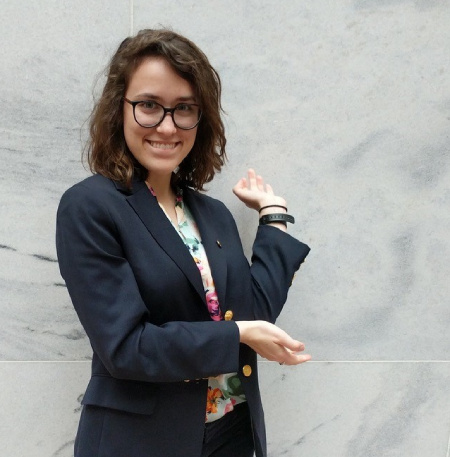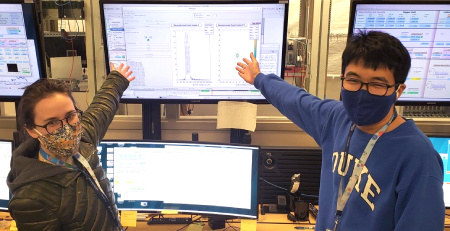Phoebe Sharp: What does it mean to be a physicist?


“I would not be where I am without SPS, and I will say that a thousand times over!”
What does it mean to be a physicist? That question rang through Phoebe Sharp’s mind as she began her graduate studies at George Washington University. “Physics can be unique because there is not a general job description for a physicist. People think of working in labs, or maybe even Albert Einstein, but the scope of jobs that physicists are involved in is quite large.” It was important to her to explore her own physics identity in a field that has a narrow perception of who is and isn’t a physicist, something she is doing to this day.
Phoebe’s physics journey has taken her from academia to nonprofits back to academia. She received her undergraduate physics degree from Rhodes College and went on to take an internship with the American Physical Society, where she was the project coordinator for the Bridge program. The Bridge program provides students with research experience, advanced coursework, and coaching to prepare them for a graduate school application. In her role, Phoebe connected students with Bridge-certified institutions that know the importance of mentorship, financial stability, and the students’ academic need. This time away from academia made her realize she wanted to keep moving up, and it became clear that receiving her graduate degree was important. She is now pursuing her graduate degree in nuclear physics, studying short-range correlations. And she is not shy about the impact the Society of Physics Students (SPS) had on these decisions. “I would not be where I am without SPS, and I will say that a thousand times over!”
SPS gave Phoebe a breadth of opportunities, ranging from event planning to leadership roles, all while building her physics network. She is so proud of the work she did as chapter treasurer, publicist, and outreach coordinator that it ultimately inspired her to become the associate councilor for Zone 10. She fondly remembers this position, one that supported chapters in Western Tennessee, Arkansas, Louisiana, and Mississippi, as a time that allowed her to meet new people and encourage students to get more involved with SPS. A great example is when she travelled to New Orleans for the Acoustical Society of America meeting and went above and beyond to engage with area colleges that did not send SPS representatives to Zone 10 meetings. As a result of her efforts, SPS members from Xavier University of Louisiana began attending. It’s people like Phoebe who make SPS an extraordinary source of support for physics students.
If you ask Phoebe where she sees herself after graduating from George Washington University, she will tell you her options are wide open. That’s all a part of finding her identity within the field. Whether she pursues a postdoc at a national lab or finds a career in industry, Phoebe’s presence goes far to expand our idea of who is a physicist in an area where women make up roughly 20% of individuals. When you support SPS you are supporting students like Phoebe, whose contributions to the physics community include not just their research, but also their willingness to forge their own paths in discovering what being a physicist means to them.